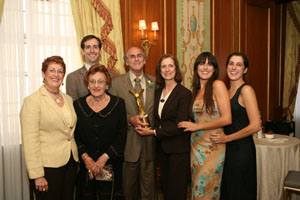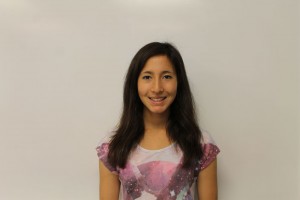Westport, a small suburban town with a modest population of 25,000, is home to a spectrum of residents, from young families, to businessmen, to retirees. Thanks to its excellent schools,Westportwas also the town that Dr. Ralph Steinman, recent recipient of the Nobel Prize for medicine, chose for his family.
“We moved to this town because of Staples,” said Alexis Steinman, his daughter, and a graduate of Staples class of 1994.
This year, the Nobel announcements thrustWestportinto the spotlight when the late Steinman, who lived onNorth Avenuewith his wife, received the prestigious award on Oct 3. As the Steinman family and the community celebrated a prestigious honor, it simultaneously mourned a great loss.
Steinman died just three days before receiving the Nobel Prize in Medicine for his 1973 breakthrough in immunology, when he discovered dendritic cells. These cells can be used in therapies and vaccines to combat autoimmune diseases and cancer, the very disease that claimed Steinman’s life.
The family moved toWestportin 1983 from Sleepy Hollow, N.Y., according to Steinman’s other daughter, Lesley ’94. All three of Steinman’s children, the two girls, and Adam, a son, are Staples graduates. Although Dr. Steinman was always on the first train toNew Yorkin the morning and at work all day, he still made time for family.
“His life as a scientist and father were very interwoven,” Lesley said.
Steinman’s children described him as a typical Staples parent. Adam Steinman ’90 was a member of the Model UN, math team, and marching band; Lesley embraced field hockey and Orphenians, while Alexis was a cheerleader and member of Staples Players. Steinman attended plays, field hockey games, concerts, and parades, despite his busy schedule. The Staples parking lot was where Steinman taught his children to drive.
Steinman could often also be found at local beaches, from Burying Hill toCompoBeach. “We had the tide schedule on our refrigerator,” Alexis said.
Steinman would immerse himself in scientific journals while his children played in the sand. He would also bring colleagues from the lab toWestport, “the country,” for barbeques; in fact, his daughter says he was known as “the grill master.”
There has been an outpour of support for the Steinman family following Dr. Steinman’s passing.
“Our neighbors left bouquets and notes saying, ‘we had no idea a Nobel scientist lived next to us,’” Alexis said.
Steinman was a professor atRockefellerUniversityinNew York City, where he taught and conducted research. Education was why Steinman and his wife moved toWestport; it also was the foundation of his own success. Steinman had always been interested in science, but became driven to do research in his college years atMcGillUniversityand later atHarvardMedicalSchool.
“He wanted to solve the problems of mankind,” Lesley said.
Steinman’s discovery of dendritic cells was a major development in the field of immunology. According to Dr. Joel Kabak, who teaches AP Biology, dendritic cells are surveillance cells that help detect pathogens. These cells attach to the pathogen, engulf it, and display particles of it, or antigens, on their surface. Their next stop is lymph nodes, where they present the antigens for recognition and destruction by lymphocytes.
Dendritic cells can have a role in preventing and treating cancer.
“The human body is always producing cancer cells,” Kabak said. “Dendritic cell surveillance can recognize these cells and cause them to be destroyed by apoptosis.”
Because cancer cells have certain abnormalities that distinguish them from normal cells, they can be recognized in an immune response.
Cancer became more than just a research topic for Steinman. In a twist of irony, Steinman was diagnosed with pancreatic cancer in the spring of 2007. Steinman used dendritic cell therapy, a treatment he developed, on himself.
“He was very keen on getting the research out of the lab,” Lesley said. “He wanted to develop vaccines to cure the illness, not just keep it at bay.”
The family believes that Steinman’s use of traditional chemotherapy and his own research, in trial form, prolonged his life.
The announcement of Steinman’s prize came only three days after his death on Sept. 30. Although the Nobel Prize cannot be awarded posthumously, the Nobel Assembly had announced the award without knowledge of Steinman’s death. The committee reconvened to discuss the situation, and ultimately decided that Steinman will still receive the award.
In the community, Steinman’s loss will forever be felt.Westporthas gained recognition for a Nobel-winning resident, but it has also lost a researcher, beach bum, and family man.
“Not only was he a great scientist,” Alexis said, “but he was a great dad.”














































